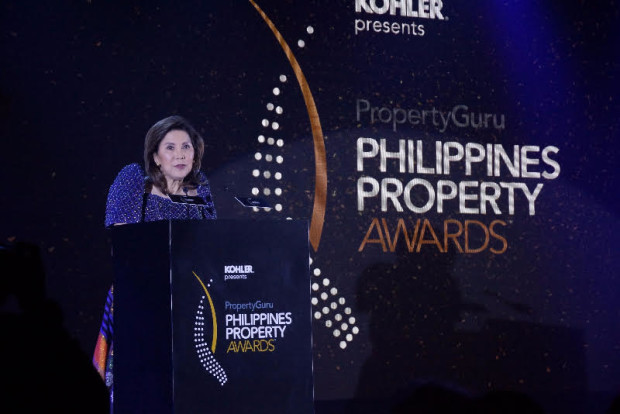Developers urged to both protect environment, spur inclusive growth

Tourism Secretary Wanda Tulfo-Teo calls on real estate developers to become advocates of a sustainable, inclusive, and climate-resilient Philippine tourism industry, during the Property Guru Philippines Property Awards 2017 held on May 4, 2017, at the Fairmont Makati. (Photo released by the Department of Tourism)
MANILA — Tourism Secretary Wanda Tulfo-Teo has called for a paradigm shift in real estate development to protect the environment while spurring inclusive economic growth in emerging urban centers outside Metro Manila.
Speaking at the Property Guru Philippines Property Awards 2017 held in Makati City last Thursday, Teo appealed to real estate developers to become advocates of a sustainable, inclusive, and climate-resilient Philippine tourism industry.
“Not only do you provide homes and workspaces to Filipinos but also employment and business opportunities to our micro, small, and medium enterprises (MSMEs). I am one of those who are sincerely happy every time you decide to ramp up investments in Mindanao. But I challenge you all to do more,” she said in her speech.
The DOT chief pointed to the ongoing construction boom in the country as key to uplifting the lives of many ordinary Filipinos and noted how the real estate industry had evolved over the years from “simply constructing buildings to creating livable communities and workplaces.”
Teo said infrastructure and property development proved useful in addressing issues in the tourism industry, particularly in the Visayas and Mindanao where tourism-based local economy can be jump-started to
make tourism development more inclusive.
The DOT’s National Tourism Development Plan 2016-2022 anchors its mandate on tourism infrastructure, a large part of it is dominated by the requirement for improved transportation networks, primarily through the expansion of airports, seaports, and roads.
“At present, we still have tourism destinations that lack facilities and amenities. There are some that don’t have at all. Worst, we have a few that are on the brink of decline due to uncontrolled environmental degradation,” she said.
The Cabinet secretary, however, said construction and development should also promote sustainability, adding that a number of tourism destinations in the Philippines have been located in some of the most ecologically- and culturally-sensitive areas as Bohol, Palawan, and Batanes.
Sustainable tourism development, Teo said, should lead to the “management of all resources in such a way that economic, social, and aesthetic needs can be fulfilled while maintaining cultural integrity, essential ecological processes, biological diversity, and life support system,” citing a World Tourism Organization’s definition.
As the real estate industry continues to grow at many fronts—be it residential, commercial, and industrial, “it is incumbent upon all of us stakeholders to ensure that we are one in pursuing sustainable tourism development wherever in the country,” to which, she said, the private and public sectors must work on together, according to Teo.
Twenty-nine established and up-and-coming developers from Luzon, Visayas, and Mindanao summed-up this year’s list of winners at the Property Guru Philippines Property Awards. Megaworld Corp. was deemed the runaway winner as it bagged nine gongs and special awards, including Best Developer for the second consecutive year. SFM